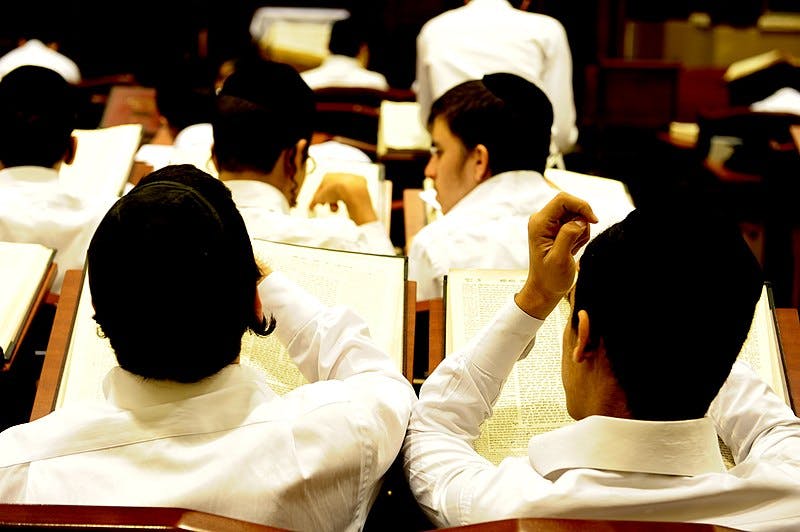New York Yeshivas See Daylight in Long-Simmering Struggle With State Regulators
New York’s orthodox Jewish community hopes to convince state officials to recognize the importance of religious education as the Board of Regents considers revising graduation requirements for all students in the state.

After years of hostility toward orthodox yeshivas in the state, New York’s Board of Regents, the state’s primary education regulator, is looking at graduation requirements in all educational institutions in the state — a move that could lead to a breakthrough and preserve the autonomy of the Jewish educational institutions.
New York’s orthodox Jewish community hopes it can steer the conversation in a direction that recognizes the importance of religious education in and of itself as the regents embark on a plan to revise graduation requirements for students in the state.
“If they redefine graduation requirements across the state, they’re redefining the meaning of substantial equivalence,” the director of yeshiva services at the Agudath Israel of America, Rabbi Yehoshua Pinkus, told the Sun.
According to New York State law, non-public schools — even religious ones — are required to provide an education that is “substantially equivalent” to the instruction provided in public schools.
Over the past decade, the state has pressured the yeshivas, where curricula and teaching methods are substantially different from those in traditional American public schools, to modify those curricula to be more in line with their state-funded counterparts.
In chasidic yeshivas, for example, students spend most of their time engaged in biblical and talmudic studies. Yeshiva advocates argue that these studies inculcate the “critical thinking” skills equivalent to those learned by students in public schools, even if the subject matters are not the same.
The yeshivas have been sparring with state officials over proposed new regulations that would give local school districts oversight over their operations. These school districts would evaluate whether non-public schools are meeting standards of “substantial equivalence.”
Non-compliant institutions would lose their status as schools, and enrolled students could be deemed truant and their parents fined or even jailed as a consequence.
Some, like Rabbi Nosson Scherman, have warned that such regulations would allow the state to impose curricular requirements that run counter to the cultural and religious values of these yeshivas.
The requirements incumbent on the yeshivas are tied directly to the standards set by public schools. Lower standards for public school graduation, which the Board of Regents is now considering, could provide a path to relief for the Orthodox Jewish schools.
Currently, New York students must complete their coursework and pass at least five Regents examinations on various academic subjects with a score of 65 or higher to earn a high school diploma. The standards are intended to demonstrate college readiness.
A commission convened by the Board of Regents is reviewing those graduation standards and considering “different avenues” for students to demonstrate diploma competency. These avenues could include practical demonstration of vocational skills, for example.
In initial focus groups, stakeholders across the state indicated a preference for abolishing the exams in favor of a student portfolio or other opportunity “to apply their knowledge and skills in real-world contexts” to assess graduation preparedness.
“A ‘one-size-fits-all’ approach to education doesn’t work for many of our students and we must transform the system to provide equitable avenues to success for all students,” the chancellor of the Board of Regents, Lester Young, said.
Among alternatives to the current diploma requirements, Mr. Young has advocated for “performance assessments” — skill demonstrations outside the confines of a standardized test — for students in career and technical education programs.
“They are recognizing that the current definition of graduation doesn’t work for all students,” Rabbi Pinkus said. “College readiness is not the be-all and end-all of education.”
Mr. Pinkus is urging the regents to adopt a more “inclusive” vision of success after high school, considering, as an example, the vocational value of a Jewish education for jobs like rabbis, scribes, and mohels — circumcisers.
One of the leading proponents for increased regulations on yeshivas, Naftuli Moster, denounced the possibility of conversation between the Agudah and regents.
“Agudath Israel has demonstrated again and again that their goal is to deprive-ultra Orthodox children of an education,” Mr. Moster wrote to the Sun. “Indeed, there are dozens of Yeshivas under their purview, particularly Hasidic boys’ high schools, which offer Zero secular education — no English, no math, no science, and no social studies. Adding them to committees where they can formally push for illiteracy is ill-advised.”
The commission will begin its work this fall. Over the next two years, it will develop a series of recommendations for graduation assessments. The final report will be presented to the Board of Regents by the summer of 2024.
Meanwhile, the Board of Regents will vote on the substantial equivalence regulations this fall. If adopted, all New York yeshivas would be required to undergo their first evaluations by 2024.

